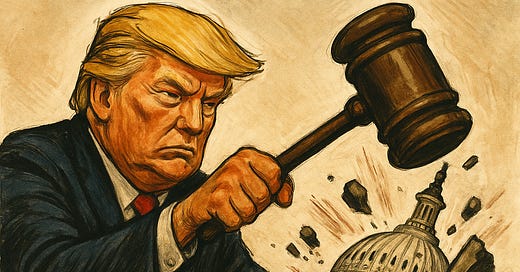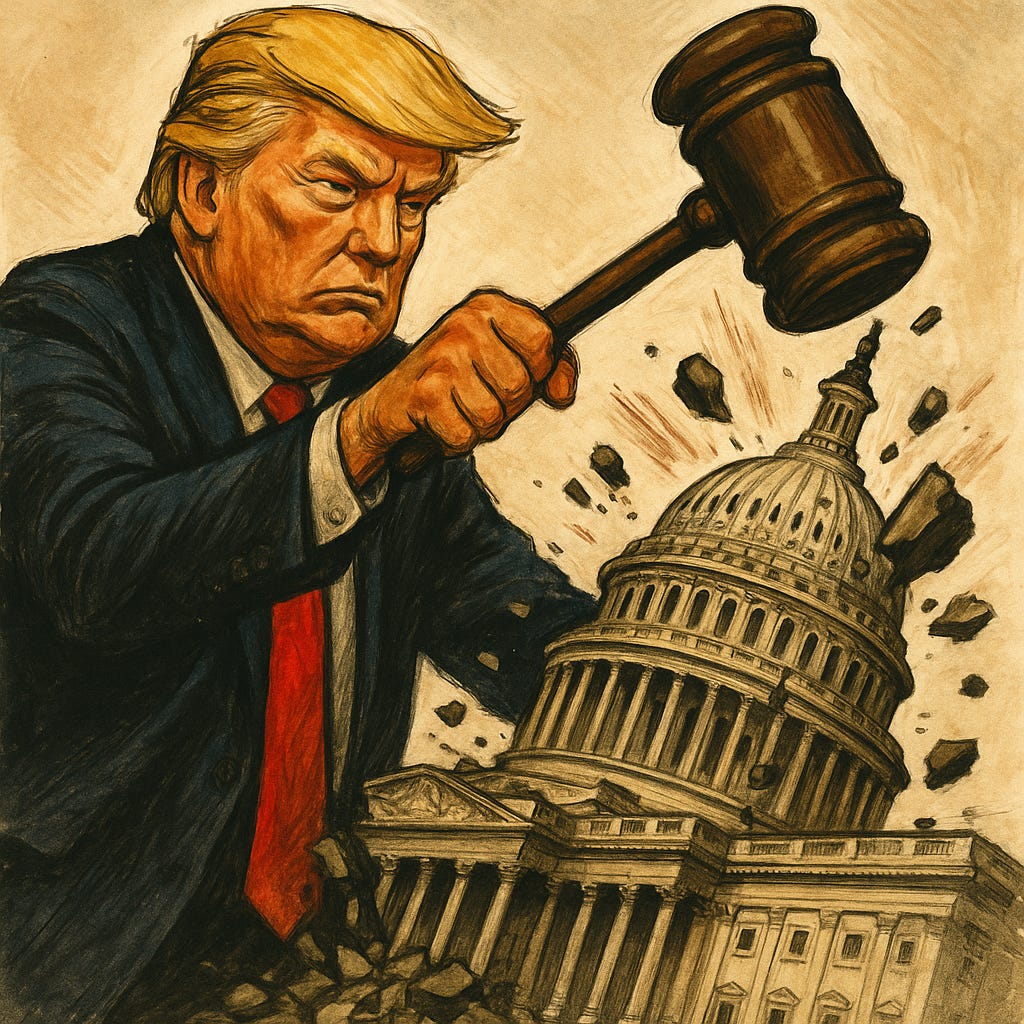Donald J. Trump is the 47th President of the United States. That’s not satire, not a drill, not a meme. It’s the world we live in—again. And whether you voted for him or not, whether you believe he was reinstalled by fate or derailed by lawfare and returned by rage, the reality remains: he’s not leading from the fringe. He is the government. The tanks are his. The courts are conservative. The House and Senate lean his way. The Constitution hasn’t been torn up—it’s just being read by a different narrator this time.
So when Trump sent three B-2 bombers to obliterate Iran’s nuclear facilities in June 2025, it wasn’t a rogue move by a madman. It was the logical endpoint of years of bottled-up fury, judicial sandbagging, and economic stalemates. His tariffs had been blocked. His deportation dragnet was kneecapped by courts demanding "process". So he reached for the only lever that hadn’t been ripped from his hand: the war machine.
This wasn’t just about Iran. This was about proving a point—about flipping the bird to a system that let Obama deport millions in silence but called Trump a fascist for trying the same. About showing that if you take away his domestic tools, he’ll play smash-and-grab with foreign ones. This was a tantrum with payloads.
And if that feels reckless, remember: it’s American tradition.
From Wesley Clark’s infamous admission that the U.S. had a post-9/11 plan to take out seven countries in five years, to the velvet glove coups pushed by NGOs and think tanks, America has long blurred the line between moral crusade and market disruption. Libya, Iraq, Syria—pick your rubble pile. We don’t rebuild nations. We demolish threats. We privatize what’s left. And we move on.
Trump didn’t invent the Doctrine of Rubble. He just stopped apologizing for it.
But let’s not ignore the symbolic crucible at the heart of this moment: Israel. The American right is in a spiritual civil war over it. The MAGA base wants Fortress America. No more world police. No more sand wars. But Israel is the exception that tests the rule. To the evangelical Right, Israel is sacred. To the nationalist Right, it's a strategic sibling. To the Bannonite purists, it's a loyalty test. Support for Israel is no longer just foreign policy—it’s cultural alignment, aesthetic clarity, moral triage.
And that’s where the deeper crisis lies. Trump isn’t breaking his "America First" promise by backing Israel. He’s enforcing it—by drawing lines around who deserves to be in the club. No more global HOA, no more democracy-on-demand, no more gender workshops in Kandahar. Just allies who can shoot straight and don’t need hand-holding.
We’ve long mythologized Israel in our films, spy novels, and subconscious. The competent Mossad agent. The tough-as-nails woman in frizzy hair and desert boots. Israel plays the role America wrote for itself but can no longer convincingly perform. It’s the last Western power that still acts like one.
So Trump’s choice to bomb Iran isn’t a betrayal of MAGA—it’s its apex. It’s the point at which memes become missiles, spite becomes doctrine, and realpolitik becomes personal.
Welcome to the empire in denial. Welcome to the spite war.
Appendix
✅ Fact-Check TRUE
Trump is the 47th President as of January 20, 2025
Obama deported 3M+ people (many via expedited removal)
Wesley Clark did say the U.S. planned to topple 7 countries in 5 years
The MAGA base includes both non-interventionists and Israel hawks
Israel has a revered role in American pop culture and conservative mythology
❌ Fact-Check FALSE
There is no confirmed evidence Trump bombed Iran "out of spite"—that’s analysis
There is no formal "Doctrine of Rubble"—that’s rhetorical framing
America’s foreign interventions are not always cynical; motives are mixed (security, economics, ideology)
⚖️ Relevant Laws and Precedents
War Powers Resolution (1973): Limits president’s unilateral military engagement to 60 days without Congressional approval
AUMFs (2001, 2002): Still used to justify wide-ranging military actions
INS v. Chadha (1983): Checks on executive branch immigration enforcement power
📚 Historical References
Nayirah testimony (1990): Fabricated claim used to build support for Gulf War
Operation Desert Storm, Iraqi Freedom, Odyssey Dawn: All examples of U.S.-led military actions framed as liberation
Obama’s “Terror Tuesday” drone strike kill list: Executive-led kinetic policy without Congressional approval
❓ FAQ
Q: Did Trump break his promise of "no more wars"? A: Not necessarily. Supporting allies (like Israel) or launching limited strikes doesn’t equal prolonged nation-building.
Q: Is MAGA anti-war or just anti-globalist? A: Both. But there’s a divide—some want total retreat, others want ruthless clarity about who gets support.
Q: Why is Israel such a cultural touchstone for the U.S.? A: It plays America’s favorite role: the competent underdog who wins by grit. It’s our mirror and our myth.
🧠 Glossary
Spite War: A conflict initiated as much from personal grievance or political obstruction as from strategy
Doctrine of Rubble: Rhetorical term for U.S. policy of bombing regimes and leaving them destabilized
Color Revolution: Popular uprising (often with NGO/media backing) aiming to depose authoritarian regimes
Soft Power Empire: An empire maintained through media, NGOs, finance, and influence—not boots on the ground
MAGA: Make America Great Again—a populist-nationalist movement often skeptical of globalism and intervention
tl;dr
Contemporary American politics and foreign policy are viewed as a critical and often cynical landscape, characterized by internal fragmentation and a foreign policy yielding unintended, often destructive, consequences. Domestically, the nation grapples with a "confederacy of us" where a confused yearning for rebellion manifests as "French Revolution cosplay", lacking clear ideology or targets, and both the political Right (MAGA) and Left engage in "regime warfare" or a "color revolution turned inward", each wielding powerful tools like lawfare and narrative control while paradoxically claiming to be the "Rebel Alliance" despite functioning as "Death Stars". This era is profoundly shaped by Donald Trump's "anti-fragile" political persona, wherein public attempts to shame or scandalize him only paradoxically amplify his strength, transforming attacks into iconography and solidifying his role as a "meme engine" and "shame-eater king" who metabolizes scandal into popular support. Concurrently, there has been a profound collapse in public trust regarding traditional appeals to empathy, with "weaponized empathy" and "baby gambit" narratives proving ineffective due to oversaturation and perceived hypocrisy, leading to widespread "empathy fatigue" and "ethical nihilism". In foreign policy, there is a deep critique of American interventionism, arguing that efforts to impose democracy or capitalism on sovereign nations like Iraq, Libya, and Afghanistan often result in "rubbleization" and instability, making America appear as "the villain" rather than a liberator. This is further elaborated through the concept of a "soft power American empire" that colonizes ideologically through NGOs, aid, and institutional frameworks, creating dependency and extracting resources under the guise of "modernization" and "civil society support," with "democracy" serving as an "interface" for control rather than genuine participatory governance. Trump's foreign policy approach, including his support for Israel, is characterized as "strategic restraint" and a loyalty to competent allies who fight their own wars, a stark contrast to past "bureaucratic adventurism" or "humanitarian imperialism", notably exemplified by his bombing of Iranian nuclear sites, which is interpreted as a "spite war"—a direct consequence of judicial and political constraints on his domestic agenda, demonstrating how foreign military action can become a substitute for stalled internal policies. Ultimately, the sources collectively suggest that American political and foreign policy landscapes are increasingly defined by manufactured realities, strategic manipulation, and a profound disconnect between stated intentions and actual outcomes.














Share this post